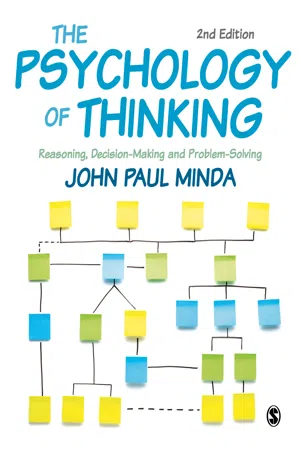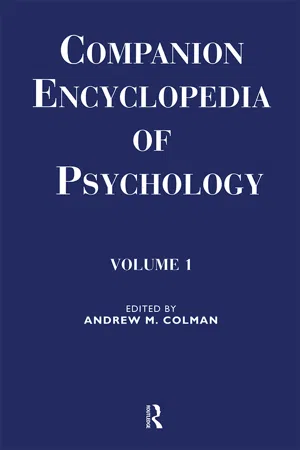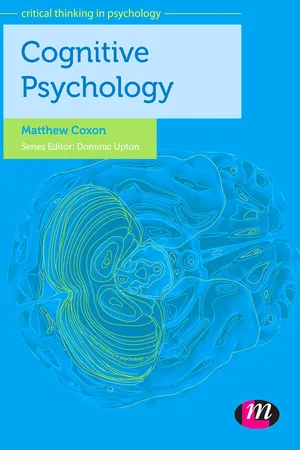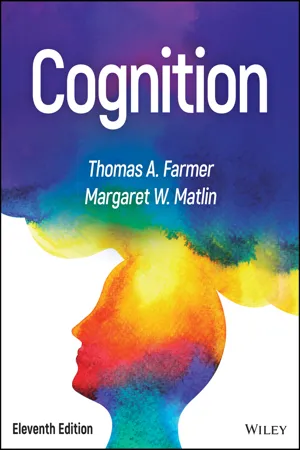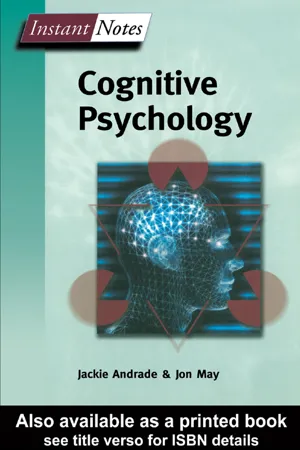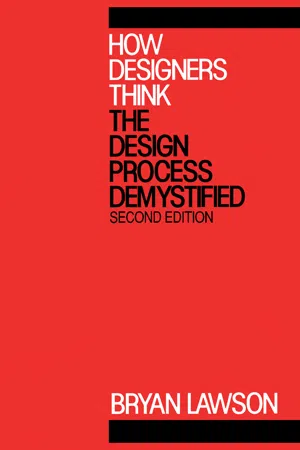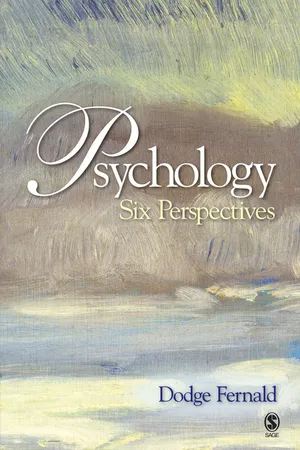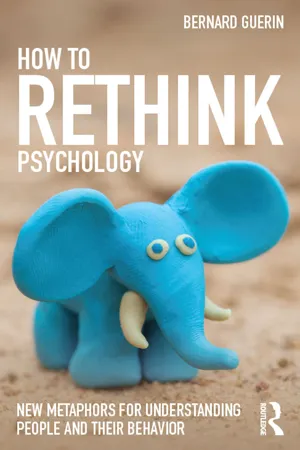Psychology
Thinking
Thinking refers to the mental processes involved in forming thoughts, making decisions, and solving problems. It encompasses various cognitive activities such as perception, memory, reasoning, and decision-making. In psychology, thinking is studied to understand how individuals process information, perceive the world, and make sense of their experiences.
Written by Perlego with AI-assistance
Related key terms
1 of 5
12 Key excerpts on "Thinking"
- eBook - ePub
The Psychology of Thinking
Reasoning, Decision-Making and Problem-Solving
- John Paul Minda(Author)
- 2020(Publication Date)
- SAGE Publications(Publisher)
1 The Psychology of Thinking Thinking is so central to the human experience that it has been described as the essence of being. We are all familiar with the phrase, “Je pense donc je suis” or “I think therefore I am”. This comes, of course, from Descartes’ Discourse on Method (1637) and underscores what is so crucial and compelling about the study of Thinking. Humans, like other animals, behave, learn, respond, communicate, and remember. But humans also think. We can discover something new by Thinking about it. We can solve problems in the mind, visualize solutions, and arrive at an important decision by Thinking. We can be aware of our own thoughts and aware of the consequences of our actions and behaviours. This book is about the psychology of Thinking. That might sound redundant, given that psychology is often defined as the study of the mind or of mental activity. In other words, if psychology is not about Thinking, what else can it be about? Psychology is a very broad field, encompassing everything from the study of neurotransmitters and basic neuroanatomy to the study of learning and memory to the understanding of mental health and the study of group behaviour. This book is concerned with the study and understanding of the thought process. Thinking is usually studied within the broader field of cognition. Cognitive psychology has traditionally been defined as the study of information processing and behaviour. This encompasses everything from basic attention and perception to memory, concepts, and Thinking. As a topic within the study of cognitive psychology, the psychology of Thinking is concerned with complex mental behaviours, such as problem-solving, reasoning, decision-making, and becoming an expert. A good understanding of basic cognition is very useful in understanding the psychology of Thinking, but it is not necessary - eBook - ePub
- Nancy Fenton, Jessica Flitter, Jessica Flitter(Authors)
- 2015(Publication Date)
- Research & Education Association(Publisher)
Chapter 9 CognitionPsychology involves the scientific study of the behavior and mental processes of humans and animals. The term cognition refers to the mental processes portion of the study of psychology and can be translated simply to mean Thinking. The term Thinking alone, however, does not do justice to the complex and varied processes that comprise cognition. Cognitive psychologists investigate the wide range of processes that make up Thinking, including perception, memory, attention, reasoning, language, and problem solving. Cognitive neuroscientists take the study of thought even further to determine the neural processes and brain regions responsible for various types of cognitions. This chapter on cognition addresses four of the largest and most integrated areas of cognitive research: memory, language, Thinking, and problem solving.MemoryMemory is the cognitive process that allows individuals to retain knowledge of information and events and is the result of three processes: encoding, storing, and retrieving. Cognitive psychologists investigating memory examine the process in terms of information processing , or how information travels through the nervous system, including perception, memory creation, reasoning, and formulating responses. Information-processing theorists have presented a variety of stage models to explain human cognition, but the theory that has received the most attention is the Atkinson and Shiffrin information-processing model of memory.The three-stage information-processing model of memory , developed by Atkinson and Shiffrin, describes memory as a sequential process moving through three distinct stages: sensory memory, short-term memory, and long-term memory. A visual representation of this model is represented in Figure 9.1. Information flows from one stage to the next as it is encoded, stored, and retrieved. The original concept of short-term memory within this model has been expanded by Alan Baddeley and renamed working memory and consists of additional components. Within the working memory model there is a central executive that controls and directs attention through a visuospatial sketchpad (visual picture) and phonological loop (verbal rehearsal). In addition, the central executive also coordinates the information transfer between working memory and long-term memory through the episodic buffer - eBook - PDF
- John P. Houston(Author)
- 2014(Publication Date)
- Academic Press(Publisher)
These in-clude: 1. Cognition as information processing. Many psychologists think of cognition as the overall process-ing of information. According to Neisser (1967), cognition is an inclu-sive term that refers to all the proc-esses by which sensory input is transformed, reduced, elaborated, stored, retrieved, and used. Although very broad and general, this defini-tion does have value because it underlines the fact that many cogni-tive psychologists think about think-ing in terms of information process-ing. They use the language of computers. In fact, some have at-tempted to construct computer pro-grams that will simulate human Thinking. These efforts usually fall under the heading of artificial intelli-gence. 2. Cognition as manipulation of mental symbols. Some psychologists prefer to think of cognitive events as the manipulation of mental symbols. As we have seen, a symbol is any-thing that stands for, or represents, something else. Therefore, when I ask you to think of a dog, and you do so, whatever it is that you are think-ing of is a symbol for dog. Symbols free us from being trapped in the present. They allow us to make excursions into the past and future. For example, when you think of the Boston Tea Party, you are visiting the past through the use of symbols. When you think about the next presi-dential election, you are moving into the future in a way which would not be possible without symbols. 3. Cognition as problem solving. As you will recall, we mentioned prob-lem solving back in Chapter 1. A problem exists when a motivated or-ganism is blocked from attaining a goal by an obstacle or obstacles (see Figure 1.5). Some cognitive psychol-ogists like to think of problem solv-ing as the essence of cognition. They feel that cognition refers to the ways in which we gather and use informa-tion in the pursuit of the solution to problems. Obviously, some cognitive events, such as finding the answer to a mathematical question, involve problem solving. - eBook - ePub
Companion Encyclopedia of Psychology
Volume One
- Andrew M. Colman(Author)
- 2018(Publication Date)
- Routledge(Publisher)
When people perform mental arithmetic, we would describe this as an act of thought. So is a computer also Thinking when it performs computations to solve problems? It appears that it is, although some philosophers (e.g., Searle, 1980) maintain that computer intelligence is intrinsically different from that of the human mind. The point of the analogy, however, is that we can see that computers can perform complex acts of information processing-depending upon their programming-but without any need to assume that they are conscious. Once you equate Thinking with information processing, then the task of the modern cognitive psychologist is clear: understanding thought is the problem of discovering the software of the human brain. Many psychological theories in fact are formulated as working computer programs which attempt to simulate the behaviour of a human being who is solving a problem or engaged in some other cognitive activity.In spite of this advance, arguments persist among cognitive and social psychologists as to the value of introspective reports. Some cognitive psychologists disregard them entirely on the basis of much evidence that such reports can be both incomplete and misleading (Nisbett & Wilson, 1977). One interesting line of argument is that verbal reports are useful indicators of thought processes but not as used in the tradition of introspective reporting (Ericsson & Simon, 1980). According to this view, verbalizations are the products of cognitive processes and can be fruitfully interpreted by the psychologist when subjects are asked to "think aloud" while performing a task or solving a problem. Introspective reports fail because first, they are retrospective rather than concurrent, and second, they invite subjects to describe their Thinking or to theorize about the causes of their behaviour.The psychology of Thinking can be broadly defined to cover a wide range of topics. For example, Gilhooly (1982) distinguishes between directed Thinking- as found in problem solving and reasoning-undirected Thinking- as in day-dreaming-and creative Thinking. In this chapter we shall focus on directed Thinking: thought aimed at achieving specific goals. This is an area in which reasonable theoretical progress has been made, and for which there are clear practical applications in everyday life.Studies of directed Thinking fall broadly into three main areas which are described as problem solving, reasoning, and decision-making. We shall consider each in turn. - eBook - ePub
- Matthew Coxon(Author)
- 2012(Publication Date)
- Learning Matters(Publisher)
So cognitive psychology is the scientific study of the mind. This means that cognitive psychologists may be interested in anything that involves the mind. It really doesn't take long to work out this is quite a lot of things to study. In reality, then, there are some topics that have received relatively little attention while a significant number of other topics have resulted in substantial amounts of excellent research. We'll focus upon the six key areas that the British Psychological Society (BPS) considers important when studying this subject at undergraduate level. These demonstrate the broadness and possibilities of cognitive psychology and are an excellent starting point. For our purposes, then, cognitive psychology will involve the studying of:- Thinking and reasoning;
- learning and memory;
- language;
- perception;
- attention;
- consciousness.
Throughout this book we will look at the psychology of making decisions; solving problems; remembering; forgetting; speaking; reading; writing; perceiving; recognising; focusing attention; and dividing attention – to name but a few.As you learn more about cognitive psychology you will find it has wide links with many other research areas. The term ‘cognitive’ is often attached to many areas of psychology, and science more widely, to reflect the integration of the philosophy and methods of cognitive psychology within different disciplines. For example, you may hear of cognitive neuroscience, cognitive science, cognitive therapy, cognitive behavioural therapy, developmental cognitive neuroscience, animal cognition, and social cognition. These are all diverse disciplines and are therefore beyond the reach of this book. However, in the last chapter of this book I will introduce you to cognitive neuropsychology, a branch of cognitive psychology that investigates the effects of brain injury and other brain damage, and looks to see what we can learn from these about the processes of the mind.Research and Methods
The types of research questions people ask, and the methods used to answer them, are as diverse as the areas studied. There are some key principles that underpin much of this research work, and a few key methods that have been used lots across the years. These specific methods will be introduced in more detail later in this chapter; at this point, it is important to know that cognitive psychologists rely heavily on the scientific method - eBook - PDF
- Thomas A. Farmer, Margaret W. Matlin(Authors)
- 2023(Publication Date)
- Wiley(Publisher)
Cognitive Psychology: Overview The term cognition, or mental activity, refers to the acquisition, storage, transformation, and use of knowl- edge. Cognition is inescapable, meaning that your cognitive processes are always at work. They grant you the ability to recognize and interpret stimuli in your environment and to react strategically to such INTRODUCTION TO COGNITIVE PSYCHOLOGY 2 information. Cognitive processes grant you the ability to plan, to create, to interact with others, and to process the thoughts, sensations, and emotions that you experience. If cognition operates every time you acquire some information, place it in storage, transform that information, and use it . . . then cognition includes a wide range of mental processes! This textbook will explore many of these mental processes, such as perception, memory, imagery, language, problem solving, reasoning, and decision making. As you will see throughout this book, your cognitive processes do not function in isolation from one another. Instead, they work together in intricate and highly coordinated ways to create your conscious (and sometimes nonconscious) experiences. For example, you are performing multiple cognitive tasks simultaneously as your read this paragraph. You are using pattern recognition to create words from an assortment of squiggles and lines that form the letters on this page. You are also consulting your memory and your knowledge about language to search for word meanings and to link together the ideas in this paragraph. Additionally, right now, as you think about these cognitive tasks, you are engaging in another cognitive task called metacognition— you are Thinking about your own thought processes. - eBook - ePub
- Jackie Andrade, Jon May(Authors)
- 2004(Publication Date)
- Taylor & Francis(Publisher)
Section A The nature of cognitive psychology
DOI: 10.4324/9780203488294-1A1 Cognition
Key notes
Cognition Cognition is the study of the mental processes underlying our ability to perceive the world, remember, talk about and learn from our experiences, and modify our behavior accordingly. It includes functions such as perception, memory, language and thought. Assumptions about cognition The mind is a limited capacity information-processing system that behaves in a law-like fashion. Cognition is the product of top-down and bottom-up processes. Top-down processing refers to the influence of knowledge and expectations on functions such as language, perception and memory. Bottom-up processing is processing driven by an external stimulus. Cognitive functions are often assumed to be modular, that is to operate independently of each other. Philosophical basis Functionalism views mental events as causal or functional because they serve to transform incoming information into output (different information or behavior). Mind is the ‘software’ of the brain and can be studied independently of it. For materialists, the mind is the brain and is studied by investigating brain activity directly. Choosing an approach is partly a matter of choosing an appropriate level of explanation for the topic of interest. Related topics Methods of investigation (A2 ) Issues in consciousness research (K1 ) Cognition
In 1967, Ulric Neisser published a book with the title Cognitive Psychology - eBook - ePub
The Intelligent Mind
On the Genesis and Constitution of Discursive Thought
- Richard Dien Winfield(Author)
- 2015(Publication Date)
- Palgrave Macmillan(Publisher)
2 Whatever those thoughts may be, they cannot be formed and apprehended without being verbalized in either inner or overt speech. The meaning of thought may be completely imageless, but that meaning cannot be verbalized unless imagination keeps in mind the configuration of the words that express Thinking. Consequently, Thinking always involves imagination to supply at least the signs of the words with which thoughts are formulated. Moreover, the thoughts that Thinking conceives may not be pure, deriving their entire content from logical determination. Thought can equally conceive concepts, judgments, and inferences that are empirical, deriving their content from general representations supplied by imagination and intuition. In the latter case, Thinking will conceive thoughts whose content is dependent upon and in relation to external sources. The thoughts so conceived do not lose their form as thoughts, but their content is alien to that form. The psychology of Thinking therefore involves distinct types of thought characterized by different relations between the form and content of Thinking. Each of these types of thought involves the logical determinations of concept, judgment, and syllogism, but each realizes these logical determinations in particular psychological activities distinguished by the psychological factors they employ. In all cases, language is necessarily at work, without having to undergo any grammatical or lexical modification. Consequently, the different stages in the psychology of Thinking are not stages in linguistic development. Although thought always involves language, the development of Thinking proper is distinct from the phylogenetic genesis of language, the historical modifications of language, and the ontogenetic maturation of discursive individuals.The different relations between the form and content of Thinking represent different stages in the autonomy of thought. Whenever Thinking has a content different from thought, it occupies itself with something extraneous, something given independently of its own activity. In that case, Thinking has a formal character, reflecting how its activity does not generate the content of what it thinks. Instead, it draws that content from some other source. The formality of a Thinking whose form and content fall apart thus involves heteronomy, in that Thinking takes on a content it finds given instead of Thinking something immanent to thought itself. The more Thinking determines the content of what is thought, the more heteronomy is overcome, and the more conceptual autonomy is achieved. - eBook - PDF
How Designers Think
The Design Process Demystified
- Bryan Lawson(Author)
- 2014(Publication Date)
- Butterworth-Heinemann(Publisher)
TYPES AND STYLES OF Thinking 101 we may expect to discover much more about the way we design since it is clearly the executive which is responsible for switching our attention from one part of a problem to another or allowing us to reorganise our perceptions in new ways. As we shall see these are vital skills for the designer. The cognitive theorists 5 approach to Thinking is also attractive to those who seek to understand the design process because it draws many parallels between thought and perception. Both primary and secondary processes are postulated, the primary thought process being a multiple activity like parallel processing in computers. These crudely formed thoughts are similar to the preattentive processes in vision or hearing, being only drawn to our conscious attention if selected for detailed and deliberate elaboration by the secondary processes. It is in the secondary processes where all the real work is done. These processes have to be learnt and developed and are obviously dependent upon what is already memorized and the way material has been organised in primary processing. The cognitive theories thus lay great emphasis upon the way we organise perceived information and store it. Failure to recall is seen as analogous to a failure to notice something in a visual scene. Thus attention in perception and thought is seen as responsible for directing our thoughts and thus crucial to problem solving. This theme will be taken up again in a rather less theoretical and more practical way when we consider methods of stimulating creativity and improving problem solving skills in design. Types of Thinking In his classic treatise on the human mind Ryle (1949) observes that Thinking is a polymorphous concept. Like the term farming, Ryle suggests, Thinking embraces many different kinds of activity which may have little in common. - eBook - PDF
- Douglas Bernstein, , , (Authors)
- 2015(Publication Date)
- Cengage Learning EMEA(Publisher)
We begin by examining a general framework for understanding human Thinking and then go on to look at some specific cognitive processes. BASIC FUNCTIONS OF THOUGHT What good is Thinking, anyway? Thinking involves five main operations or functions: describing, elaborating, deciding, planning, and guiding action. Figure 7.1 shows how these functions can be organized into a circle of thought . The Circle of Thought Consider how the circle of thought operated in Dr. Wallace’s case. It began when she re-ceived information about Laura’s symptoms that allowed her to describe the problem. Next, Basic Functions of Thought 219 Copyright 2016 Cengage Learning. All Rights Reserved. May not be copied, scanned, or duplicated, in whole or in part. Due to electronic rights, some third party content may be suppressed from the eBook and/or eChapter(s). Editorial review has deemed that any suppressed content does not materially affect the overall learning experience. Cengage Learning reserves the right to remove additional content at any time if subsequent rights restrictions require it. 220 Thought and Language Dr. Wallace elaborated on this information by using her knowledge, experience, and powers of reasoning to consider what disorders might cause such symptoms. Then she made a decision to investigate a possible cause, such as anemia. To pursue this decision, she came up with a plan —and then acted on that plan. But the circle of thought did not stop there. Information from the blood test gave new descriptive information, from which Dr. Wallace elaborated further to reach another decision, create a new plan, and guide her next action. Each stage in the circle of thought was also influenced by her overall intention— in this case, to find and treat her patient’s problem. The processes making up the circle of thought usually occur so quickly and are so complex that slowing them down for careful analysis might seem impossible. - eBook - PDF
Psychology
Six Perspectives
- Dodge Fernald(Author)
- 2007(Publication Date)
- SAGE Publications, Inc(Publisher)
It ranges from fan-tasy to high-level problem solving. Rarely used without a modifier, it includes analytical Thinking, which is separating a whole into its basic components, and synthetic Thinking, which proceeds in the opposite direction, developing a whole from diverse parts. It includes convergent Thinking, aimed at discov-ering a central idea or single answer to a problem, and divergent Thinking, which produces several different answers to the same problem (Sternberg, 2000). Except for immediate sensation, Thinking depends on memory. But what do we manipulate in Thinking? To a large extent we manipulate concepts. A concept designates a category or a general idea about something; it considers a group of objects or events as equivalent in some respect, for they possess a common property. Many words express concepts. The word book expresses a concept; it refers to sheets of printed pages bound together. A textbook, novel, and biography are subclasses of a book; each of them also represents a concept. Thinking is based on concepts that, in turn, are acquired through Thinking. The words Principia Mathematica, meaning Newton’s book, refer to that particular object; therefore, they are not a concept. The words Logic Theorist do not designate a concept, for they too refer to a particular object, event, person, place, or other specific instance. In effective thought, concepts must be organized in some meaningful fash-ion, often expressed in a proposition, which is a statement or declaration. Thinking in the propositional mode uses words and makes a statement; it proposes or asserts something in words. As symbols, these words typically do not resemble their referents; they do not appear like whatever they represent. In contrast, images have the appearance of their referents. A visual image of a book looks like a book; an auditory image of a song sounds like that song, and so forth for gustatory, kinesthetic, and other sensory modalities. - eBook - ePub
How to Rethink Psychology
New metaphors for understanding people and their behavior
- Bernard Guerin(Author)
- 2015(Publication Date)
- Routledge(Publisher)
We have common-sense metaphors about these which psychology has adopted uncritically on the whole, but the main metaphor from the 1960s onwards has been that ‘cognitive processes’ take place within our brains, and that these processes do the Thinking and believing events, or they are those events. I do not want to throw out all the research on cognition but, rather, to give it a new metaphor that is in line with a contextual view of how things operate in the world (Guerin, 2001a, 2001b). This does not reject any cognitive data, just reframes them (fairly radically, I must admit …). Part of this is going to comprise some of the weirdest of the 180º changes in reThinking in this entire book, so here and elsewhere (Chapter 5) I will give you more places to read others who have said the same or similar things
Index pages curate the most relevant extracts from our library of academic textbooks. They’ve been created using an in-house natural language model (NLM), each adding context and meaning to key research topics.
